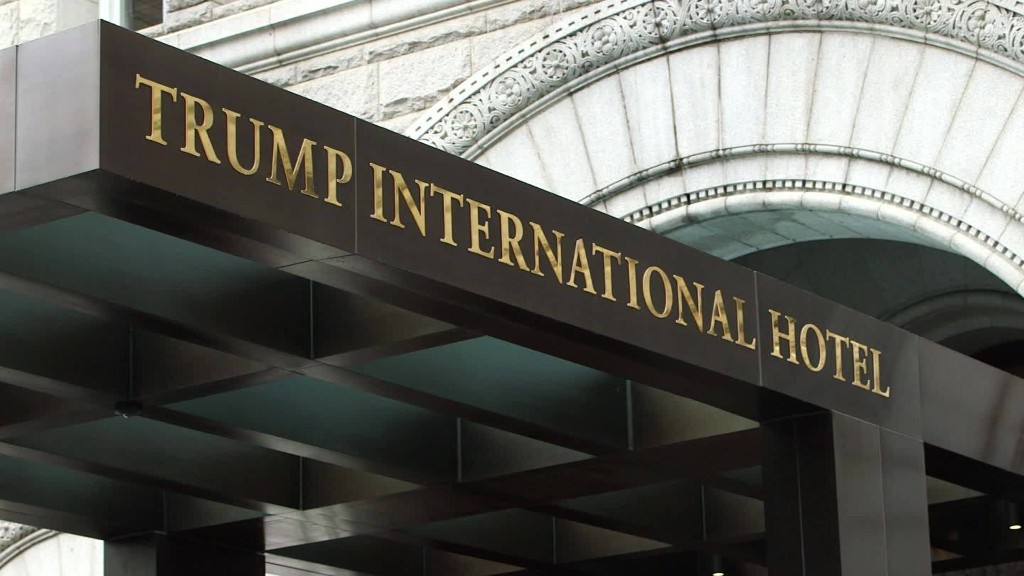
The state of Maryland and the District of Columbia are taking President Trump to court.
A lawsuit filed Monday in federal court says Trump is violating the Constitution's Foreign Emoluments Clause, which prohibits the president from accepting payments from foreign governments without the consent of Congress.
The suit cites the president's luxury hotel in Washington, which has been at the center of concerns about conflicts of interest, and his worldwide network of hotels, golf courses and other commercial properties.
Washington, D.C., Attorney General Karl Racine told reporters that foreign governments are already spending money at Trump properties to curry favor with Trump. He said Saudi Arabia alone has spent hundreds of thousands of dollars.
"We are a nation of laws, and no one, including the president of the United States, is above the law," Racine said. "What are we to do, sit back and let the president police himself?"
Maryland and the district also argue that they themselves are being harmed economically -- because their businesses have to compete with Trump's, and because their governments face pressure to provide Trump with permits and tax breaks.
"The president is bound by oath to 'faithfully execute' his office and 'preserve, protect and defend the Constitution of the United States," the lawsuit says, and the president must "disentangle his private finances" from domestic or foreign powers to honor that oath.
"Never before has a President acted with such disregard for this constitutional prescription," it says.
The suit was filed by the attorneys general of Maryland and the district, both Democrats.
Related: Trump's Justice Department fires back on claim he violated the Constitution
Despite a pledge to isolate himself from the business, Trump held on to his assets and placed them in a trust in his name. That arrangement means he will benefit from the success of the business, even if he doesn't reap the rewards until after he leaves office.
The suit argues that Maryland the District of Columbia have been harmed by Trump's ongoing ownership. They cite convention centers and other properties in Maryland and the district that compete with the Trump hotel.
In addition, the suit says states have standing to sue because they entered a contract, the Constitution, that prohibits the president from receiving emoluments. The suit says that not just hotel payments but tax breaks and permits count as emoluments.
Related: Trump plan for hotel profits blasted by top Democrat
Maryland and the District of Columbia argue that they should be shielded from "undue pressure to provide emoluments to the president," and that other states can "curry favor from the president by providing emoluments that other states lack."
The suit asks the court for an injunction blocking Trump from accepting foreign money. Lawyers will seek access to Trump's personal tax returns as part of the legal process known as discovery, Maryland Attorney General Brian Frosh told reporters.
White House press secretary Sean Spicer said the White House would move to have the case dismissed.
The Justice Department has already asked the court to dismiss a separate lawsuit that covers similar ground.
That lawsuit was filed in January, moments after Trump was inaugurated, by Citizens for Responsibility and Ethics in Washington, a government watchdog organization. A nonprofit restaurant group, a New York hotel and restaurant owner, and a woman who books events at hotels in Washington have since joined the suit as plaintiffs.
CREW is outside counsel on the new lawsuit filed by the attorneys general.
Spicer called CREW an "advocacy group with partisan ties." He also noted that both of the attorneys general involved are Democrats.
"It's not hard to conclude that partisan politics may be one of the motivations behind the suit," Spicer said.
The Trump Organization has promised in the past to take steps to address some ethics concerns. It told lawmakers in April that it would "track and identify" revenues received by its hotels from foreign governments, which it would then donate to the U.S. Treasury.
But in documentation sent to lawmakers the company said it would be "impractical" to track everyone. That means it the business will not try to identify people who haven't specifically identified themselves as representing a foreign government.
Representative Elijah Cummings, the top Democrat on the House Oversight Committee, blasted that plan.
He told the company in a letter last month that Trump should either divest his ownership or get permission from Congress to accept all sources of foreign money if it's too difficult to identify those payments.
